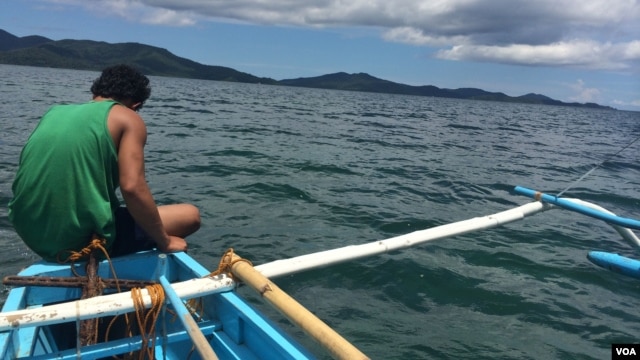
Fishermen sail past the Ulugan and Oyster Bay navy bases into waters of the South China Sea, Sept. 15, 2014. (Jason Strother/VOA)
As boats from the
small fishing village of Macarascas head out into the waters of the South
China Sea, off Palawan’s west coast, they pass by the Philippines ’ Ulugan Bay
Village council
leader Jane Villarin said she worries about the tensions between her country
and China in what is known
here as the West Philippines Sea
“It’s protection
for us. We live here in the West
Philippines Sea Philippines
Villarin added
that she would welcome the American navy too.
Following the
April summit between President Barack Obama and Philippines
“Today I’m
pleased that we are beginning an important new chapter in the relationship
between our two countries and its starts with our security with the new defense
cooperation agreement that was signed today,” said Obama during that trip.
The Enhanced
Defense Cooperation Agreement, or EDCA, opens the door for American forces to
rotate through existing Filipino military bases. That includes facilities at
Oyster Bay, which is located within Palawan’s Ulugan Bay
Oyster Bay is
located 160 kilometers from the disputed Spratly islands in the South China Sea . Manila
Lieutenant
Colonel Ramon Zagala, chief public affairs officer for the Armed Forces of the Philippines , said the presently undeveloped Oyster Bay base is a promising site for American and
Filipino forces to work together as outlined in the new defense pact.
“The very purpose
of that base is to enhance our defense capabilities westward to the West Philippines
Sea United States
Zagala added that
if Washington accepts the offer, Oyster Bay
would still be a Philippines
He said the
development of the Ulugan or Oyster Bay facilities with U.S. help is not meant to provoke China
“I think it is
our right and it the duty of the Armed Forces of the Philippines
In May, Chinese
President Xi Jingping warned Southeast Asian countries not to form military
alliances aimed at a third party. That has been read throughout the region as a
message not to try to stop China ’s
advances into the South China Sea , especially
with American help.
Some observers
say the EDCA only agitates Beijing
Political analyst
Richard Heydarian at Ateneo de Manila University said that after the Philippines lost the Scarborough Shoal to
Chinese forces in 2012, the Aquino administration rushed to get the U.S. Washington
“There are
multiple dimensions to the EDCA that show the Philippines
He said that
includes what the U.S. role
will actually be if Filipino and Chinese forces exchange fire, how any joint
American and Filipino bases, like Oyster Bay ,
would be funded in the long term, and what environmental safeguards will be
followed in developing such facilities.
Environmental
protection is a top concern on Palawan , much
of which is a designated conservation zone. Oyster Bay
itself is home to a mangrove forest and a variety of wildlife, say advocates.
It is over these
concerns that the Puerto Princesa city government opposes the expansion of the
Ulugan and Oyster Bay bases.
Elizabeth
Maclang, a national park superintendent for Puerto Princesa, said development
would have a detrimental impact on local communities.
“If you cut the
mangroves, it will greatly affect their livelihoods. In the event of human
error, it will greatly affect all the resources that come from Ulugan Bay
But, Maclang
said, if the Philippines
Villarin, from the
Macarascas community council, said she is also concerned about potential
environmental damage. But she explained that for the people in this poor
village, or barangay, the naval base
expansion could bring in more jobs.
“It’s a sign of
development in our barangay. Maybe
more business to come, progress in our barangay,”
said Villarin.
The development
could still be halted. Opponents of the new U.S.-Philippines defense agreement
have filed petitions in the Philippines Oyster
Bay might remain as it is.
http://www.voanews.com/content/philippine-base-us-ships-draws-mixed-reactions-amid-china-tensions/2449899.html

No comments:
Post a Comment
Note: Only a member of this blog may post a comment.